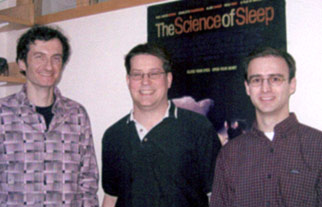Sleep is one of the major remaining mysteries in biology. Although we spend a third of our life asleep, it is still unclear why we sleep and how sleep is regulated at the level of genetic and neural circuits. Members of the Schier lab want to tackle these questions by developing and employing zebrafish as a model system. In the December 20 issue of The Journal of Neuroscience, they report that hypocretin, a gene that regulates human sleep, promotes wakefulness in zebrafish. The study provides the proof-of-principle that zebrafish can serve as a genetic model to study sleep.
Defects in Hypocretin signaling lead to narcolepsy in humans and other mammals. Affected patients are sleepy during the daytime and have fragmented sleep/wake states. David Prober, a postdoctoral fellow in the lab, cloned the zebrafish hypocretin gene and found that it is expressed in the neurons of zebrafish embryos and larvae in a pattern strikingly similar to that of mammals. He then generated transgenic zebrafish in which Hypocretin overexpression could be induced by heat shock. David and Jason Rihel, a postdoctoral fellow, found that Hypocretin overexpression promoted wakeful activity and hyperarousal. The locomotor activity of transgenic fish was greatly increased, resulting in a 60% reduction in sleep-like behavior during the night. Strikingly, these symptoms are similar to insomnia in humans, suggesting that abnormal Hypocretin signaling might contribute to this common sleep disorder.
The authors also found that the effects of Hypocretin overexpression were more dramatic in the apparent absence of circadian cues. In constant darkness or under constant light, Hypocretin was more potent in inducing wakefulness than under circadian oscillations. Apparently, the circadian system dampens the effects of Hypocretin overexpression.
Finally, since zebrafish are amenable to high-throughput screens, the study opens the door for genetic and pharmacologic screens to identify novel genes and drugs that regulate sleep.


